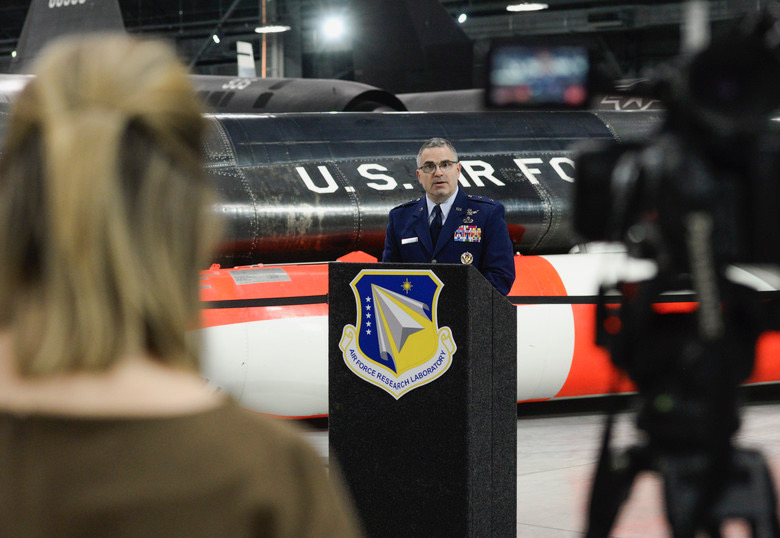EXCLUSIVE: AFRL Top Tech Picks? AI, Autonomy & Sensor Networking Likely
Posted on

AFRL Commander Maj. Gen. William Cooley
AFA 2019: The Air Force Research Lab is looking closely at artificial intelligence, autonomy and sensor networking technologies as a key areas for its Vanguard initiative, Maj. Gen. William Cooley, AFRL commander, says. The Vanguard programs are being established to advance future force concepts that “may fundamentally change how we prosecute wars,” he told Breaking Defense in an interview.
“We have not selected Vanguard programs at this date, but we’re in a discussion about what those potential Vanguard programs could be,” Cooley said. “Webster’s says ‘Vanguard’ is the lead element in a military formation. So, we’re purposely trying to identify those things that may fundamentally change the way in which we are approaching warfare and our concept of operations.”
At the same time, he said, those Vanguard technologies have to show promise of bridging the so-called ‘valley of death’ between the lab and the battlefield — a challenge that both the military and the commercial research worlds struggle with, Cooley said.
“We are taking our time and being thoughtful to ensure that the programs we invest in, and that we designate as Vanguards, have a high probability of becoming a program of record, and getting into the inventory of the Air Force,” he said. That includes working with potential-end users to find resources to see development through to the end, he said.
AFRL, headquartered at Wright Patterson AFB in Ohio, has set aside 20 percent of its annual budget to fund the cutting-edge Vanguard programs once they are selected. The Air Force has requested $165.6 billion for the lab in fiscal year 2020, a 6 percent increase from 2019.
The initiative is part of AFRL’s overarching new strategy, released in April after being jumpstarted by former Air Force Secretary Heather Wilson in 2017. The new strategy is based on three broad objectives: developing and delivering “transformational strategic capabilities;” reforming its management to better advocate for research within the service, and expanding its partnerships both within the US government and outside.
“The partnerships we have with academia, with industry and our allies are essential,” Cooley stressed. “It’s not just having an awareness of what others are doing, but coupled partnerships where we are working together toward the same objectives.”
He noted that starting a competition of ideas is one piece of the strategic revamp.
“We’ve got to make sure we’re competing ideas … for what things will actually make a difference; how can we achieve capabilities we believe we need,” Cooley said, explaining that this is why the new strategy, in a break from the past, does not specify technologies of interest. AFRL instead focuses on needed capabilities “because we recognized there are specific technologies competing to achieve those capabilities, which is exactly what we want,” he said. “We want those technologies to compete to see which ones are actually going to deliver.”
Subscribe to our newsletter
Promotions, new products and sales. Directly to your inbox.
